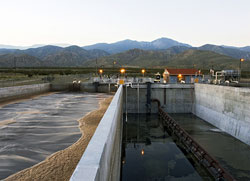Siemens' ISBR system to help Pennsylvania WWTP meet effluent limits, significantly reduce sludge hauling costs

The Siemens Industry Automation Division's ISBR technology combines the Omniflo SBR system with the Cannibal solids reduction system to provide economic benefits.<br>
Valued at almost US$2 million, the system will be an integral part of the plant's upgrade, helping to meet effluent limits and to significantly reduce sludge production and associated hauling costs. The first such installation in the state of Pennsylvania, the ISBR system is expected to become operational by spring 2012.
Aging equipment made it difficult for the existing WWTP in Palmerton to meet state effluent limits at times. The ISBR system installed by Siemens Water Technologies, a business unit of Siemens Industry Automation Division, will provide the plant with biological treatment that meets these limits while minimizing the amount of sludge produced by the biological treatment plant. The ISBR technology combines the Omniflo SBR system with the Cannibal solids reduction system. Engineer ARRO Consulting (Reading, Pennsylvania) included solely the SBR system in its original plant design, as it would help the plant meet state nutrient removal limits. But after working through the economics with the small municipality, the engineer concluded the payback of also installing the Cannibal system would far exceed the high energy costs associated with aerating an aerobic digester, the need to install additional sludge handling equipment, and significant sludge hauling fees paid by the existing plant.
The ISBR system has an inherent biological nutrient removal (BNR) capability through the use of automated controls that provide optimum environments for each BNR reaction. At the Palmerton WWTP, a single integrated control system from Siemens Water Technologies will help optimize overall plant performance and serve as a single point-of-contact for the process. It will also balance ISBR system operating conditions to help maintain effluent quality at varying flows and loadings and minimize solids production. The small footprint Omniflo ISBR system will produce a low sludge yield of 0.4 pounds (kilograms) of biological solids per pound (kg) of BOD per day, which is slightly higher due to the impact of a nearby previous zinc smelting operation.
To learn more about Siemens' ISBR system, please stop by WEFTEC.11 Booth # 1549 or visit www.siemens.com/weftec.
The Siemens Industry Sector (Erlangen, Germany) is the world's leading supplier of innovative and environmentally friendly products and solutions for industrial customers. With end-to-end automation technology and industrial software, solid vertical-market expertise, and technology-based services, the Sector enhances its customers' productivity, efficiency, and flexibility. With a global workforce of more than 100,000 employees, the Industry Sector comprises the Divisions Industry Automation, Drive Technologies and Customer Services as well as the Business Unit Metals Technologies. For more information, visit http://www.siemens.com/industry
The Siemens Industry Automation Division (Nuremberg, Germany) supports the entire value chain of its industrial customers – from product design to production and services – with an unmatched combination of automation technology, industrial control technology, and industrial software. With its software solutions, the Division can shorten the time-to-market of new products by up to 50 percent. Industry Automation comprises five Business Units: Industrial Automation Systems, Control Components and Systems Engineering, Sensors and Communications, Siemens PLM Software, and Water Technologies. For more information, visit http://www.siemens.com/industryautomation
Reference Number: IIA2011102806e
Contact
Mr. Peter Jefimiec
Industry Automation Division
Siemens AG
Gleiwitzerstr. 555
90475 Nürnberg
Germany
Tel: +49 (911) 895-7975
peter.jefimiec@siemens.com
Contact USA
Mrs. Allison Britt
Water Technologies Business Unit
Siemens Industry, Inc.
2501 N. Barrington Rd.
Hoffman Estates
IL 60192
USA
Tel: +1 (847) 713-8477
allison.britt@siemens.com
Media Contact
More Information:
http://www.siemens.com/weftecAll latest news from the category: Corporate News
Newest articles

Parallel Paths: Understanding Malaria Resistance in Chimpanzees and Humans
The closest relatives of humans adapt genetically to habitats and infections Survival of the Fittest: Genetic Adaptations Uncovered in Chimpanzees Görlitz, 10.01.2025. Chimpanzees have genetic adaptations that help them survive…

You are What You Eat—Stanford Study Links Fiber to Anti-Cancer Gene Modulation
The Fiber Gap: A Growing Concern in American Diets Fiber is well known to be an important part of a healthy diet, yet less than 10% of Americans eat the minimum recommended…

Trust Your Gut—RNA-Protein Discovery for Better Immunity
HIRI researchers uncover control mechanisms of polysaccharide utilization in Bacteroides thetaiotaomicron. Researchers at the Helmholtz Institute for RNA-based Infection Research (HIRI) and the Julius-Maximilians-Universität (JMU) in Würzburg have identified a…



